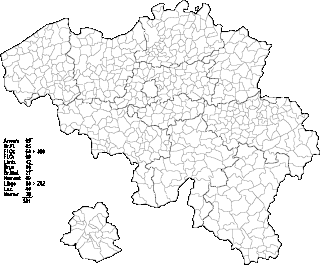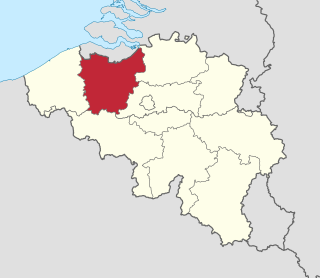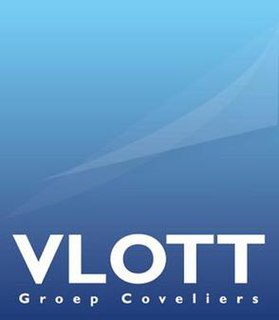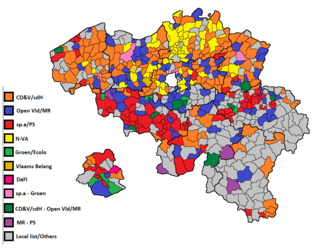| ||
All 10 provincial councils All 589 municipal councils All 8 directly elected OCMW/CPAS councils All 9 Antwerp city district councils | ||
|---|---|---|
 | ||

Dutch-speaking | French-speaking | |
German-speaking | Bilingual FR/NL | |
| Community: | Region: | |
| Flemish | Flanders | |
| Flemish and French | Brussels | |
| French | Wallonia | |
| German-speaking | Wallonia |
The Belgian provincial, municipal and district elections of 2012 took place on 14 October. As with the previous 2006 elections, these are no longer organised by the Belgian federal state but instead by the respective regions:

Belgium, officially the Kingdom of Belgium, is a country in Western Europe. It is bordered by the Netherlands to the north, Germany to the east, Luxembourg to the southeast, France to the southwest, and the North Sea to the northwest. It covers an area of 30,688 square kilometres (11,849 sq mi) and has a population of more than 11.4 million. The capital and largest city is Brussels; other major cities are Antwerp, Ghent, Charleroi and Liège.

The country of Belgium is divided into three regions. Two of these regions, the Flemish Region or Flanders, and Walloon Region, or Wallonia, are each subdivided into five provinces. The third region, the Brussels-Capital Region, is not divided into provinces, as it was originally only a small part of a province itself.

Belgium comprises 581 municipalities grouped into five provinces in each of two regions and into a third region, the Brussels-Capital Region, comprising 19 municipalities that do not belong to a province. In most cases, the municipalities are the smallest administrative subdivisions of Belgium, but in municipalities with more than 100,000 inhabitants, on the initiative of the local council, sub-municipal administrative entities with elected councils may be created. As such, only Antwerp, having over 500,000 inhabitants, became subdivided into nine districts. The Belgian arrondissements, an administrative level between province and municipality, or the lowest judicial level, are in English sometimes called districts as well.
Contents
- Electoral system
- Parties
- Foreign residents
- Brussels
- Results
- Flanders
- Background and general trends
- Provincial elections
- Municipal elections
- Wallonia
- Provincial elections 2
- Municipal elections 2
- References
- External links
- Brussels with 19 municipalities
- Flanders with 5 provinces and 308 municipalities
- In the city of Antwerp, elections were also held for its nine districts
- Wallonia with 5 provinces and 262 municipalities

The Flemish Region is one of the three regions of the Kingdom of Belgium—alongside the Walloon Region and the Brussels-Capital Region. Colloquially, it is usually simply referred to as Flanders. It occupies the northern part of Belgium and covers an area of 13,522 km2. It is one of the most densely populated regions of Europe with around 480 inhabitants per square kilometer.

Antwerp is a city in Belgium, and is the capital of Antwerp province in Flanders. With a population of 520,504, it is the most populous city proper in Belgium, and with 1,200,000 the second largest metropolitan region after Brussels.

The Belgian city of Antwerp consists of nine former municipalities which have the special status of district.
- Antwerp
- Berchem
- Berendrecht-Zandvliet-Lillo
- Borgerhout
- Deurne
- Ekeren
- Hoboken
- Merksem
- Wilrijk
In the municipalities with language facilities of Voeren, Comines-Warneton and the 6 of the Brussels Periphery, the aldermen and members of the OCMW/CPAS council are directly elected. [1]

There are 27 municipalities with language facilities in Belgium which must offer linguistic services to residents in either Dutch, French, or German in addition to their official languages. All other municipalities – with the exception of those in the Brussels region which is bilingual – are unilingual and only offer services in their official languages, either Dutch or French.

Voeren is a Flemish municipality located in the Belgian province of Limburg. Bordering the Netherlands to the north and the Walloon province of Liège to the south, it is geographically detached from the rest of Flanders, making Voeren an exclave of Flanders. Voeren's name is derived from that of a small right-bank tributary of the Meuse, the Voer, which flows through the municipality.

Comines-Warneton is a Belgian city and municipality in the Walloon province of Hainaut. On January 1, 2006, it had a total population of 17,562. Its total area is 61.09 km2 (23.59 sq mi) which gives a population density of 287 inhabitants per square kilometre (740/sq mi). The name "Comines" is believed to have a Celtic, or Gaulish, origin. Comines-Warneton is a municipality with language facilities for Dutch-speakers.
Mayors are not directly elected, instead the respective regional government (of Brussels, Flanders and Wallonia) appoint one of the elected municipal councillors. The councillors usually propose a candidate.
The result in Wallonia was largely a continuation of the major parties, without any big power shifts. In Flanders however, the nationalist party N-VA, which won in previous regional and federal elections, continued their success and became (one of) the largest party in many municipalities and the largest in three out of five provinces.

















